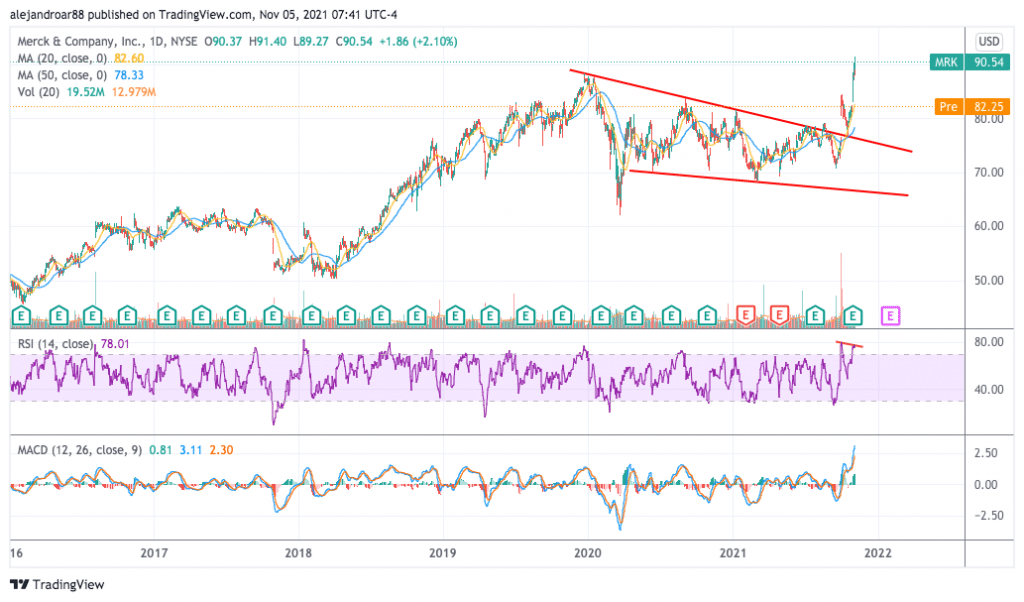Merck Stock Down 8% Today – Time to Buy MRK Stock?
Please note that we are not authorised to provide any investment advice. The content on this page is for information purposes only.
The price of Merck stock is heading down 8% this morning in pre-market stock trading action following news that the anti-viral COVID-19 pill being trialed by Pfizer has dramatically reduced the percentage of hospitalizations and death among a cohort of 1,219 patients.
The efficacy of its rival’s treatment seems to be markedly better than that of Merck’s molnupiravir anti-COVID drug, which reduced the risk of hospitalization among patients with a mild-to-moderate diagnosis by 50% compared to the 89% showcased by Pfizer’s pills.
The Pfizer study found that only 0.8% of patients who received the drug within three days after the symptoms appeared faced death or hospitalization. A similar rate was displayed for patients who took the treatment within five days after symptoms first appeared.
Pfizer’s drug – which has been named Paxlovid – consists of a bundle of three pills that must be administered two times a day. The company has already applied to obtain emergency-use approval for the drug by the US Food and Drug Administration (FDA).
Meanwhile, Merck is the first company to be granted authorization to commercialize a treatment for COVID after it got the green light from the United Kingdom’s Medicine and Healthcare Products Regulatory Agency for molnupiravir.
For Merck, the rapid approval of Pfizer’s drug amid its elevated efficacy will threaten to derail the possibility that it can bank on the commercialization of molnupiravir as much as market participants may have been expecting.
This is reflected by today’s sharp downtick following the strong 17% run-up that Merck stock experienced back in October on the back of the release of molnupiravir’s positive trial results.
What can be expected from this healthcare stock in the future? Join me in this article as I take a closer look at the price action and fundamentals to possibly answer that question.
68% of all retail investor accounts lose money when trading CFDs with this provider.
Merck Stock – Technical Analysis

The short-term $84 target for Merck stock I shared in a previous article was actually exceeded last month as market participants progressively adjusted their valuation for the company based on the positive contribution that the COVID pill could have on its top and bottom-line results.
However, today’s pre-market decline is possibly signaling weakness in this latest rally and the material impact of the news that is causing it must not be ignored – that is, the Pfizer (PFE) news.
If we do get a drop in the live session, that would result in the Relative Strength Index (RSI) posting a bearish divergence following the sharp uptick the stock experienced last month. Meanwhile, it would also be plausible to expect a reversal in momentum readings in the MACD and a subsequent decline near the signal line after the oscillator stretched to its highest level in years.
What investors may expect if this drop occurs is a full-blown return to the mean, possibly eyeing the 20-day simple moving average as a plausible landing zone. This would result in a 9% downside risk based on yesterday’s closing price. This is almost exactly how much the stock is dropping in pre-market action.
However, it is important to note that a sudden change in the market’s perception about the likelihood that Merck will lead the pack in the COVID-19 antivirals segment may result in further downside risk for the stock.
Merck Stock – Fundamental Analysis
In the previous article, I modeled the kind of boost that molnupiravir could give to Merck’s top and bottom-line performance. At an estimated price of $700 for an entire course, the drug may produce over $8 billion in extra revenues for the firm, which is more than 14% of what the company brought last year.
As a result, and assuming that profit margins remain similar to previous years (net margins of around 11% to 14%) we could have seen Merck’s bottom-line profitability jumping by 10% as a result of the positive contribution of molnupiravir’s sales.
However, the introduction of Pfizer’s seemingly more effective treatment could erode Merck’s revenue generation capacity as it is highly likely that most physicians and patients may end up shunning Merck’s candidate for Pfizer’s Paxlovid amid the wide gap in the efficacy of both treatments.
One important factor to take into account is who gets emergency-use approval first in the United States. Whoever gets that may have the lead for a short period, but in the long haul, Pfizer’s drug will likely emerge as the winner and that is bad news for Merck.
If we cut our previously forecasted contribution of molnupiravir for Merck by half – which seems plausible – the impact of the drug on the company’s bottom-line results would be quite small – perhaps resulting in a 7% jump in its earnings or so.
Considering that the stock surged 17% in October, it seems highly likely that the market will take back some of those gains in light of today’s development.






